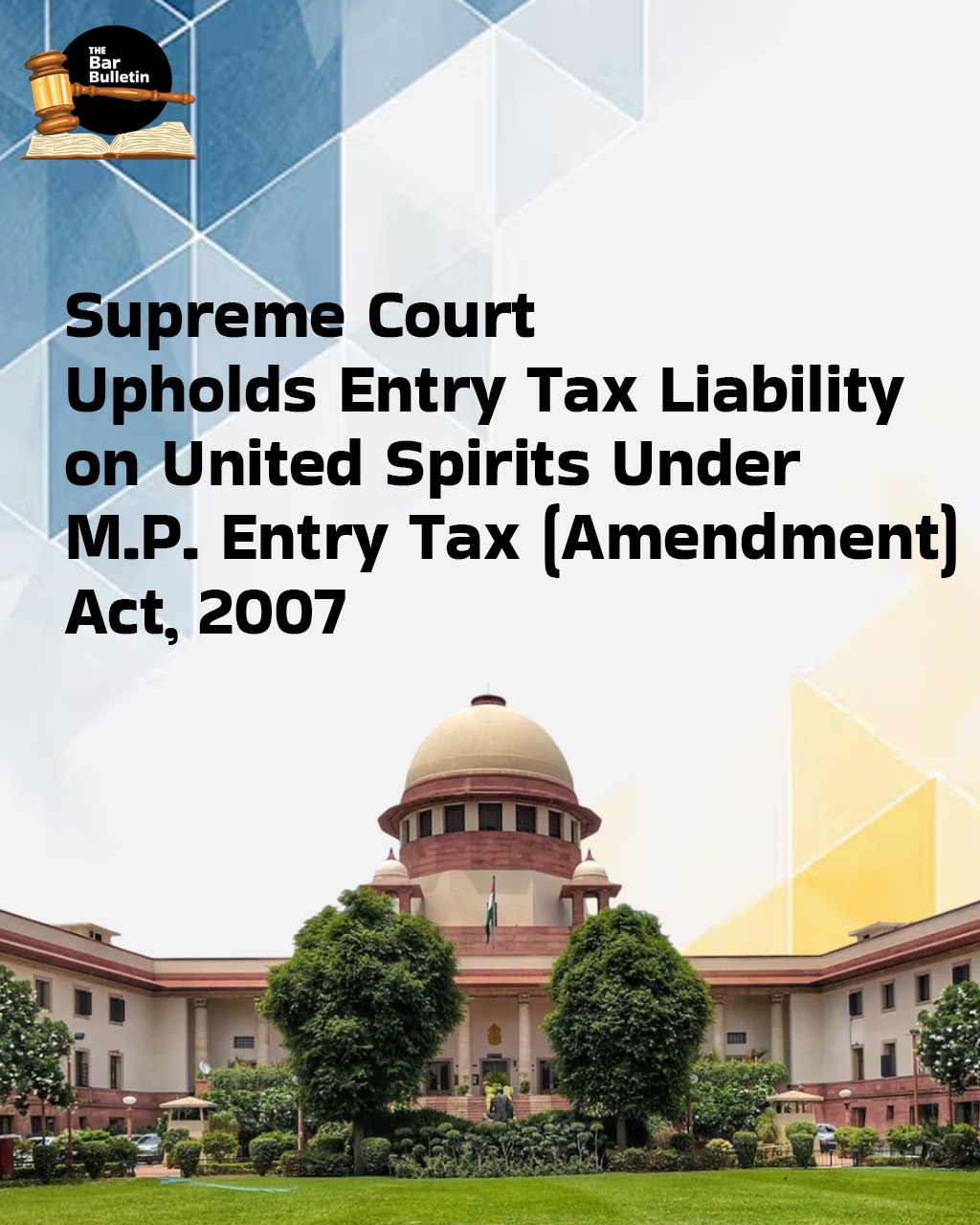The Supreme Court has upheld the levy of entry tax on United Spirits Ltd., a leading manufacturer and supplier of Indian Made Foreign Liquor (IMFL) and beer, under the Madhya Pradesh Entry Tax (Amendment) Act, 2007. Clarifying the nature of transactions involved, the Court held that there were two distinct and independent transactions one between United Spirits and the State warehouse, and another between the warehouse and the retailers. It concluded that United Spirits was responsible for causing the entry of IMFL and beer into the local area, thereby attracting entry tax liability..
The Division Bench of Justice J.B. Pardiwala and Justice K.V. Viswanathan confirmed the liability of the United Spirits to pay entry tax at the rate of 2% observing that once being a manufacturer they have sold their goods i.e., IMFL and beer to the warehouses, they have canvassed the entry of goods and the sales made by them directly gave rise to introduction of their goods to the local area to be consumed, or used, or sold by the ultimate consumer.
Since the Appellant manufacturers were dealers under the M.P. VAT Act, 2002, and the entry of goods could similarly be occasioned by the State warehouse, which might also be a dealer, the Bench referred to the provisions of Section 3 of the M.P. Entry Tax Act, 1976, as per which the incidence of taxation is on the entry in the course of business of a dealer of goods specified in Schedule II, into each local area for consumption, use or sale therein. The further requirement is that such tax was to be paid by every dealer liable to tax under the VAT Act who has effected the entry of such goods.
Speaking for the Bench, Justice K.V. Viswanathan explained that “Entry Tax is defined as a tax on entry of goods into a local area for use, consumption or sale therein levied and payable per the provisions of the M.P. Entry Tax Act, and Section 2(3) of the M.P. Entry Tax Act states that any reference to the expression “has effected entry of goods” shall be construed as including a reference to “has caused to be effected entry of goods.” The Bench refused to accept the contention that no entry tax can be levied in the absence of any notification having been issued under Section 3B of the M.P. Entry Tax Act 1976, and clarified that Section 3B is only a machinery provision and in the teeth of Section 14 of the M.P. Entry Tax Act, it is not correct to say that there cannot be any assessment or collection of Entry Tax merely because there is no notification u/s 3B.
The Bench referred to the decision in the case of K. Gopinathan Nair v. State of Kerala, (1997) 10 SCC 1, to distinguish the present scenario from a case where a canalising agency or intermediary agency is involved, and clarified that in case the role of the said agency is merely that of a name lender, the sale will be treated as inseparable. Further, referring to the phrase “occasioning the export” used under Section 5(3) of the Central Sales Tax Act, which defines the factors that were the immediate cause of the export, the Bench concluded that the appellant manufacturers have “caused to be effected the entry of goods” in the local market.
In this case, the Appellants (United Spirits) are involved in bottling and supplying Beer and Indian Made Foreign Liquor (IMFL), after obtaining a No Objection Certificate (NOC) from the officer-in-charge posted at the factory. When the goods are transported to the State Government warehouse and a transportation pass is issued in the name of the concerned warehouse, the sales are made by the warehouse in charge to the authorized retailers, who are also license holders for retail sale of IMFL and beer. Now, the Appellants had a case that their products were transported to and stored in state government warehouses, which then sold these goods to licensed retailers, and accordingly, the sale was executed between the warehouse and the retailers, but not between the manufacturer and the retailers directly. Hence, the Appellant claimed that since the warehouse caused the entry of goods into the local area, the entry tax liability should lie with the warehouse, and not the manufacturer. This claim was refuted by the Respondent (State), as per the government guidelines, the warehouses do not purchase or sell liquor but facilitate supply under state supervision, and hence, they formed an opinion that it was the Appellant and not the warehouses who effectively cause the entry of goods into the local market.
When the matter reached the Apex Court, it was found that the Appellant is a dealer as defined under the Madhya Pradesh VAT Act 2002, as it stood then, and their only contention is that the State warehouse is also a dealer, who ultimately supplies the IMFL in the local market. The Court negated this contention, answered the issue in favour of the Respondent-State, and concluded that such a scenario would make no difference since the appellants certainly occasioned the entry of goods and hence, the levy of entry tax on them is perfectly justifiable in law.
Appearances:
Appellant: AOR Manjeet Kirpal & Pooja Shrivastava, along with Advocates Palash Pareek and Vibhor Jain
Respondent: Senior AAG Nachiketa Joshi, AOR Pashupathi Nath Razdan, and Advocate Sidhartha Sinha
![]()



